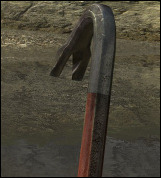My case for Half-Life 2
By dvaeg 2 Comments
I'm currently replaying Half-Life 2 for the fourth time. I decided to put some of my thoughts to paper while I did this.
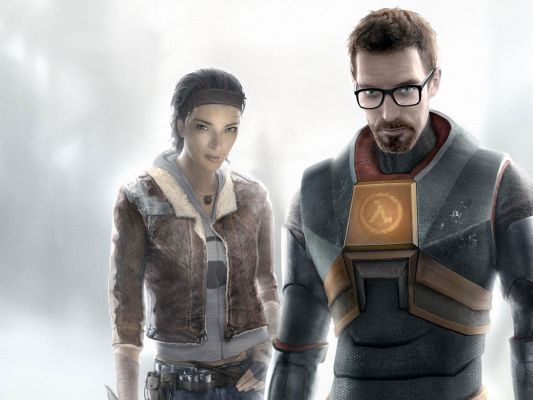
The Case
Most everyone has a favorite game, and mine is Half-Life 2. All things being equal, I consider it the greatest game ever made. After seeing a nice long thread about
those for whom this is decidedly not true, I thought I’d take some time to lay out a case for crowning Valve’s magnum opus with the title it deserves.
A caveat: Games are subjective, regardless if you view them as hobbies, entertainment, art or any combination of the three. I mean no disrespect to those who disagree, but such is the destiny for those on the Internet, to endlessly debate the relative worth of our baubles.
Half-Life 2 exists as an amalgamation of genres and individually successful set pieces that, when taken as a whole, engages the player is numerous ways that are not native to the medium. Although there are tactile responses in the shooting and physics-based puzzles, and there is exposition that is professionally acted out for your benefit, Valve intertwined a significant amount of literary devices to further enhance the game’s interactivity, even when the player isn’t interacting back.
Why the story is good
To start, Gordon Freeman’s role as the silent protagonist allows for breaking the fourth wall – a literary device where characters speak directly to the audience, enlisted them in the action. Although commonplace now, HL2 implements this device in a decidedly different way. You (Gordon) have a history, but there is only one significant portion of it that you didn’t live through yourself – going to MIT. Every other defining characteristic of the player is on display either directly through your actions or known to you by the reactions you receive. You know that you (Gordon) have a meaning in the environment because you are recognized as a savior by the people. It is no accident that you are referred to as “The One Free Man”, because you alone in a game that is soaked with oppression and slavery make a path for yourself and reject your shackles. You are both empowered and empowering with your moniker, and it’s put to good use from the first steps you take. At nearly every point where you encounter an NPC, they reflect back at you the expectations of the game in how you proceed forward. This formal patterning establishes through repetition that you (Gordon) are more than an everyman, a space marine, or some special ops hero. Small touches bring levity to the weight upon your shoulders, seen most prominently when the Vortigaunt praises you for learning so quickly – “In this, as all things, the Freeman excels”.
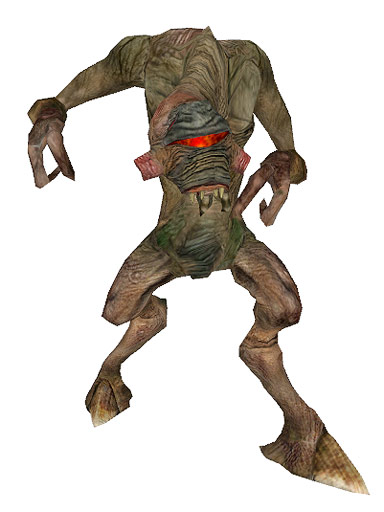
Speaking of your first steps, note how the citadel towers over the city from the moment you leave the train depot. This too is no accident, as until then your enemies have been faceless humanoids, abusing and degrading your kind for some unknown purpose. The citadel, with its obsidian/metallic finish becomes the personification of this oppression, and it’s visible in the distance in almost every area. It’s subtle foreshadowing, as you are lead far away and then right back into the citadel to face its horrors, it’s a clear method of a framing device, important as bookends for your journey. In fact, the action pushes you in a grand circle around the citadel itself, forcing you to flee on foot, hovercraft and dune buggy, but both away from and right towards the monolithic structure.
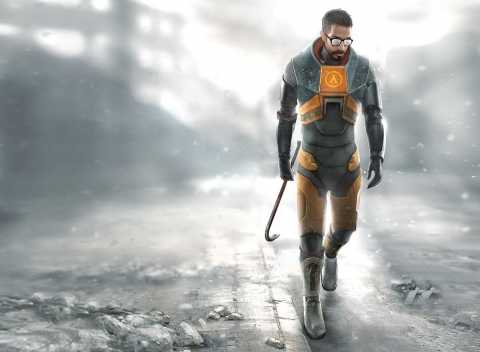
Did you notice something else when you stepped out of the train? How about when you made it to the courtyard outside? There are TVs everywhere with Dr. Breen’s face, telling you about your location, the expectations and giving you insight to what you missed in your several year sleep. This incluing allows you to be brought up to speed throughout your journey, as well as providing you with a foil that will haunt you throughout the game. It’s no accident that the Seven Day War is over when you wake up. City 17 is under martial law, Ravenholm is lost…and here you are, right in the middle. In Media Res, provides you with immediate access to the action and supports the incluing by allowing you to pick up the past while moving forward through the story.
Throughout all this there are numerous other stand-ins to support the storytelling and propel it forward, what makes this work so well is how you are party to the action, but it rarely happens to you as the player. The betrayal of Eli and Alyx has little meaning to Gordon himself, but since it happens to the NPCs you care for, they can demonstrate its impact on your behalf. If you give yourself a chance, you can read into Alyx’s personality by her relationship with her father, and the personification of her able bodyguard, Dog. She rubs his face like a real dog, but you know deep down that a pet is a luxury the people can no longer afford.
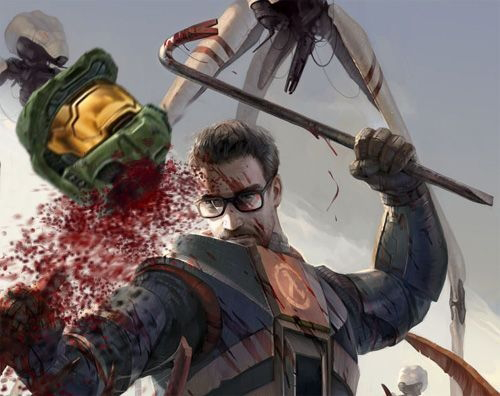
The Action
So here we have a story that liberally borrows mechanics from other medium, employing them to bring you (Freeman) into the fold. You meet old friends, new friends, and the game world unfolds before you piecemeal, each component adding a new dimension. The environments are actually structured to support your growth as a player – they start with your exile from City 17, escape after escape from more powerful enemies. You move to Ravenholm, where you alone (barring Father Grigori) face the undead masses, a thing of nightmares that forces you to toughen up. The journey then brings back into the city, making you travel long distances by vehicle to stage an escape, empowering you and the masses towards the final uprising and victory at the top of the citadel itself.
All of this is done within the confines of what was at the time a marvel of technological triumph. The physics engine, the facial engine and the tactile nature of the shooting made for a trifecta of shooting and gaming mechanics that became the norm for the genre. By purposefully never revealing Freeman into the 3 person, your immersion is complete and total, when booting up the game you exist solely within the game’s construct, and are bound by its rules.
When complete, there is no final resolution. Though it toys with deus ex machina as its final literary device, Half Life 2 stays true to itself to the end. The world is fully realized, but all you know is only what has been shown to you through your journeys. There is more, much more that is left unsaid, unresolved, and undiscovered. Like real life, you cannot hope to know and master it all, but you can only hope to carve your own path and inspire others with your actions.
But even today? Seriously?
Yes, seriously. Half-Life 2 was released with great anticipation 6 years ago (as of this writing). Games have come a long way since then, but there's a reason that Half-Life 2 still sits atop the best of lists. Games, like all great artistic mediums, will grow in sophistication and test new boundaries as it becomes more commonplace. Music, sculpture, books, films and philosophy have all become mainstays of the human experience, and games have too. Although video games are in their infancy, they are actually another step in the advancement of games as art. This long lineage evolved from chess, go, sports and Monopoly. Though it takes place on a video screen, at its core it is the same as all games, but with greater reliance on and influence from other mediums. It splits the difference between books and films, offering longer commitments than a movie, but more tactile response than a book. In both cases, and especially with films, new works of art are made each year, but they all owe homage to the seminal releases of yesteryear, their fore bearers in many different ways. The Godfather was a great film, but so was Citizen Kane. You and I might place different titles at the top of our lists, but by being at or near the top year after year, they both become something larger than today's hits.
Half-Life 2 has earned that place for a reason.
